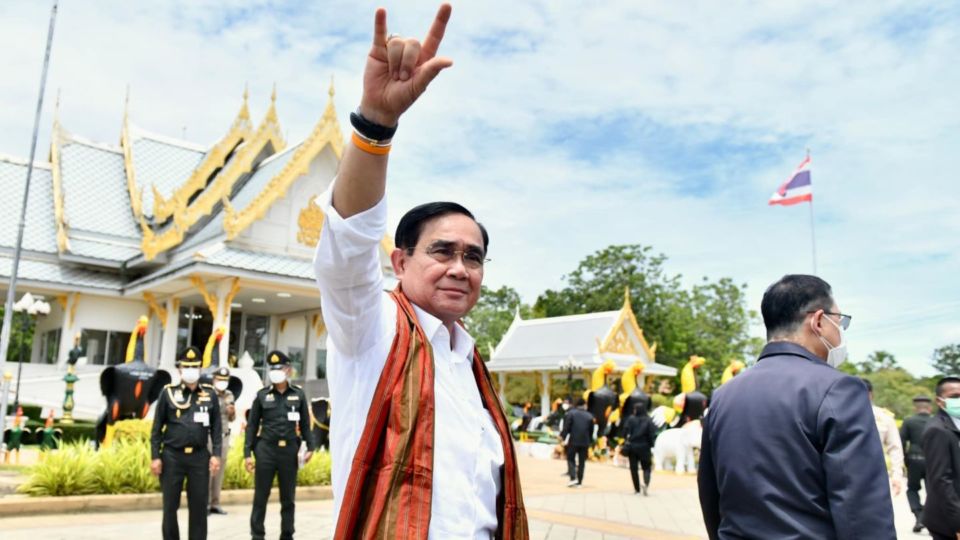The former general who seized power and then granted himself absolute power to lead Thailand over eight years ago may return to the prime minister’s seat, the Constitutional Court ruled today.
At around 3pm on Friday, the court ruled that Gen. Prayuth Chan-ocha, who was unhappily suspended from his post last month while a court reviewed his legally mandated term limit, could return to the job he held since May 2014. The verdict was read by judges Udom Sitthiwirattham, Jiranit Hawanon, and Panya Utchachon.
In their ruling, the judges reasoned that Prayuth’s term did not officially begin until the military-backed constitution came into effect in April 2017. By that measure, his eight-year term won’t be up until April 2025.
But the implications of that mean he would not be able to serve a full term after next year’s election, which has now been set for May 7, if everything goes according to plan.
Prayuth was not present to hear the verdict and made no immediate statement. He appointed his adviser, Maj. Gen. Wira Rojanawas, to appear in his stead.
Pro-democracy activists from the Ratsadon, United Front of Thammasat and Demonstration, and Thalu Fah groups have already gathered at the Pathumwan Skywalk to protest the ruling.
Several hashtags related to the ruling emerged on Twitter in Thailand today: #PM8Years, #UncleTuStays, and #GetOutPrayuth.

As tensions arose over whether Prayuth would stay in power, the court declared one day earlier on Thursday that its premises – the Government Complex’s Building A – was a “safe zone” with heightened security. The order, effective from 7pm on Thursday until 6pm on Monday, requires security approval for anyone wishing to enter the premises.
The challenge to Prayuth’s long tenure as the political head of state came under sections 158 and 170 of the 2017 Constitution, which was written under his careful supervision. It states that a prime minister shall not hold office for more than eight years in total, consecutively or not.
The dispute over whether it applied to Gen. Returning Happiness to the People centered on when Prayut’s term as prime minister actually began: When he seized power? When he named himself prime minister? When the constitution was promulgated? Or when it was rubber-stamped in the flawed 2019 election?
The opposition, of course, said it began when he seized power in 2014. Therefore, having taken office on Aug. 24, 2014, Prayuth had already served a total of eight years as of August 2022.
Prayuth’s supporters argued that the general had not yet reached his term limit since the current constitution came into force in 2017, and the clock began ticking when Prayuth “won” the 2019 general election.
Since overthrowing the remnants of Yingluck Shinawatra’s government in 2014, Prayuth has loomed large over Thailand, shaping key domestic policies, managing the transition to a new monarch, and trying to lock a set of development policies into stone for future generations.
But by some measures, Prayuth had already outstayed his welcome due to factors within and outside his control.
Established under the constitution of 1997 – considered Thailand’s most democratic – the Constitutional Court holds life-or-death power over politicians in a bid to rein in corruption. It has in fact been used in the ensuing years as a weapon to eliminate threats to the status quo by banning parties and their lawmakers on seeming technicalities, such as when the Future Forward Party was dissolved and its popular leader Thanathorn Juangroongruangkit banned two years ago.
Correction: An earlier version of this story misstated that Prayuth would be unable to continue in the role following next year’s election. In fact, he would be unable to complete a full four-year term due to his time being up in 2025.
Related
Is it too soon to remember some of our fave Prayuth moments?
Suspend Prayuth and enforce term limit, opposition party petitions court




